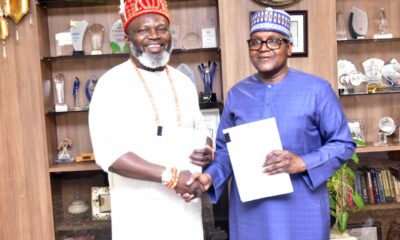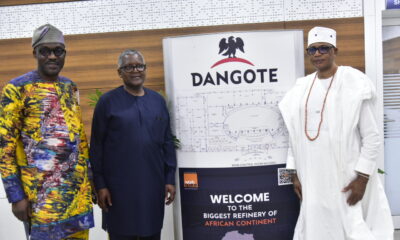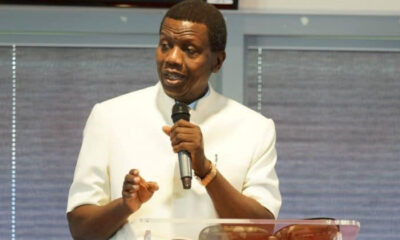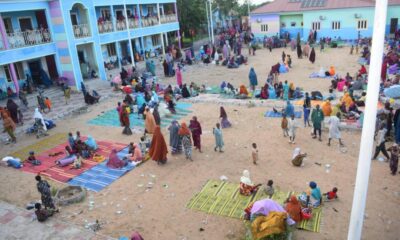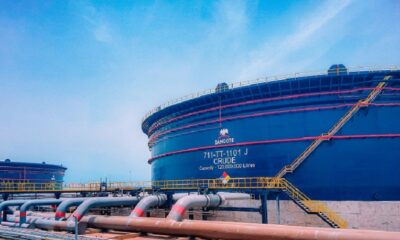Business
Deregulation, Not License For Off-spec Products Blending – Dangote Refinery
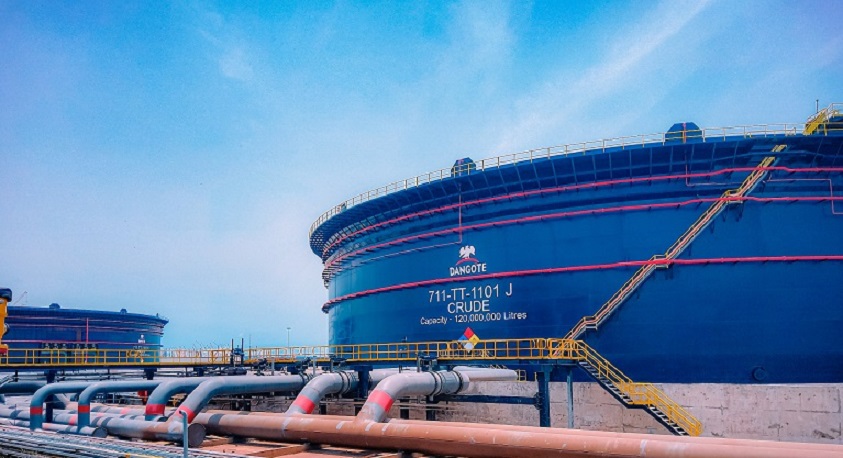
The Dangote Petroleum Refinery and Petrochemicals is of the view that deregulation should not be used as a justification for the importation of off-spec petroleum products or the undermining of Nigeria’s national interests.
This was contained in a statement on Tuesday by Dangote’s Group Chief Branding and Communications Officer, Anthony Chiejina.
The counsel came in response to remarks by Chief Executive Officer of Pinnacle Oil and Gas Limited, Robert Dickerman, on the importation and blending of petroleum products, which he framed within the context of a “deregulated commodity market.”
However, the Dangote Petroleum Refinery is of the view that his argument for a deregulated market could not obscure the serious implications of his actions, which, it claimed, not only threatened the integrity of Nigeria’s energy sector but also endangered the welfare of its citizens.
While reiterating support for deregulation and industrialisation, the Dangote Refinery emphasised that the support must be grounded in a commitment to the sustainable growth of Nigeria’s economy, while shielding the people from exploitation.
The refinery made it clear that the health and safety of Nigerians should never be compromised in the pursuit of profit.
According to the statement, “The Dangote Petroleum Refinery and Petrochemicals Company has long been an advocate for deregulation and industrialisation in Nigeria, but our support is rooted in a commitment to the sustainable growth of the country’s economy and the protection of its people from any exploitation. Unlike Dickerman’s view, deregulation should not be a licence for the importation and distribution of off-spec products or the subversion of national interests.”
The company also noted that, as an American, Dickerman should be well aware of how his own country protects its industries. It pointed to several recent examples from the United States to underline the point.
For instance, U.S. President Joe Biden recently opposed the sale of U.S. Steel to Japan’s Nippon Steel, stressing the importance of maintaining strong American steel companies supported by American workers — an example of protectionism that prioritises national economic interests over short-term profit.
Similarly, the U.S. has taken action to restrict the use of Chinese-made cranes in its ports, citing national security concerns. The U.S. has also imposed a 100% tariff on electric vehicles and a 50% duty on medical equipment imported from China, further demonstrating its commitment to safeguarding domestic industries.
The U.S. has also ramped up efforts to boost its own production of computer chips and medical supplies, driven by national security concerns and the need for economic self-sufficiency. Furthermore, during his presidency, George W. Bush used anti-dumping laws to impose tariffs on a range of Chinese goods that were considered to be unfairly priced.
“It is therefore perplexing that Dickerman, with all his experience in the U.S. market, would advocate for the importation and blending of petroleum products to Nigeria under the claim of deregulation and a free market. The fact is that he had deceitfully approached us and pleaded that we extend the pipeline from our refinery to Pinnacle’s tank farms for the purpose of blending our high-quality products with their imported products and selling them to Nigerians. We categorically rejected his request to extend our pipeline to their tank farms for such devious purposes because it would be a betrayal of the Nigerian people’s trust. The health and safety of Nigerians cannot—and should not—be compromised for profit,” the statement added.
The company also raised concerns over Pinnacle Oil’s decision to lease its tank farms to a company without any retail outlets in Nigeria, questioning the strategic intent behind such actions, particularly given that the farms are located just 500 metres from Dangote’s refinery.
It expressed its vigilance regarding the coordinated efforts to undermine the Dangote Refinery, drawing parallels to the fate of refineries in Port Harcourt, Kaduna, and Warri.
Consequently, the Dangote Petroleum Refinery called on the government, patriotic Nigerians, and local businesses to remain steadfast in defending the country’s sovereignty and economic independence.
“The choice we face is between fostering industrialisation or allowing Nigeria to remain a dumping ground for inferior products while exporting jobs. For nearly three decades, cartels and their collaborators have sabotaged efforts to develop Nigeria’s refining capacity, keeping the country dependent on imported products. The time has come to end this cycle of exploitation and ensure that Nigeria’s energy sector works for the benefit of its people,” it added.
Reiterating belief that a strong, self-sufficient energy sector is vital for Nigeria’s economic growth, the Dangote Refinery affirmed that it will continue to advocate for policies and practices that protect both industries and the well-being of all Nigerians.
The company also expressed its support for healthy competition that drives innovation and quality, and looked forward to the upcoming commissioning of the four state-owned refineries, as promised by the NNPC Ltd.
“At Dangote Petroleum Refinery, we are committed to ensuring that Nigeria becomes self-reliant in petroleum production, and we welcome competition that drives innovation and quality. However, we will never allow the continued importation and blending of petroleum products, nor the deliberate destruction of our national economy. We believe that a strong, self-sufficient energy sector is vital to Nigeria’s economic growth, and we will continue to advocate for policies and practices that protect our industries and the well-being of all Nigerians.
“We eagerly anticipate the coming on stream of the Kaduna, Warri, and Port Harcourt refineries before the end of this year, as promised by the Group Chief Executive Officer (GCEO) of NNPCL, Mele Kyari. This milestone will not only end all baseless rumours of monopoly but also position Nigeria as a refining hub for petroleum products in Africa,” it concluded.
Business
Adeleke Flaunts Local Content Records, Industrialisation Progress
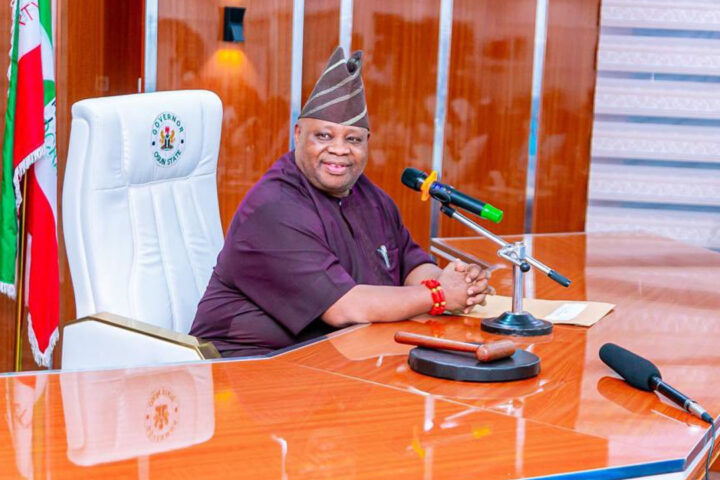
Osun State Governor, Senator Ademola Adeleke has celebrated the local content achievements of his administration, claiming it has transformed the state’s economy and strengthened local businesses.
The Governor, represented by his Deputy, Prince Kola Adewusi, made this declaration at the 2024 Trade Fair of the Osun State Chamber of Commerce and Industry held at the Trade Fair Complex, Osogbo.
This year’s fair is themed “Developing Osun Local Content Value Chain for Shared Prosperity”.
Gov Adeleke, reviewing his records on local content in the last two years, expressed pride to announce that his administration had set an unrivaled record in the promotion and commitment to local content development.
ALSO READ: Diri Celebrates Consummate Democrat, GEJ @ 67
According to Gov Adeleke, “our major infrastructural projects are being handled by local contractors. We are building up our indigenous companies to handle major jobs outside the state. Our local engineers are fully engaged in all facets of the construction processes. Our supply chain feeding the construction processes is also locally focussed and sourced.
“As local content is a tool for economic development, our multi billion naira infra plan has a focus beyond Osun money revolving within the Osun economy. We seek to stop capital flights, thereby ensuring a financially vibrant local economy that contributes to the fight against poverty and underdevelopment.
“Beyond a solvent grassroots economy, our policy ensures skill transfer. Local workers are empowered with requisite skills which they subsequently deploy as skilled service providers. We are building a pool of skilled citizens across all sectors.
“Additionally, our local content agenda is a strategy for employment creation. By adopting direct labour in many project executions, we provide jobs for the artisans and the unemployed. Osun is indeed a huge construction site with increasing job opportunities for the unemployed.
“Local content as a state strategy also drives our focus on infra growth and development. We are eager to bridge the infrastructure deficit to enhance trade and investment. We have recorded huge progress in that respect.
“Our administration is also removing possible bottlenecks in business operations in Osun state. The processing of Certificates of Occupancy is now within a 45-day window. This is billed to enhance business capacity to attract financial transactions and support within the business ecosystem.
“The era of multiple taxation is coming to an end as Osun state has now introduced a harmonized tax system. Our tax agency has become truly business friendly.
“To facilitate investment, we revive and strengthen the Osun State Investment Promotion Agency (OSIPA). The agency puts under one roof all regulatory and certification agencies of the Government.
“To accelerate the pace of industrialization, we revive the Free Trade Zone to provide over one million direct and indirect jobs for the people. We establish Markets with modern facilities, set up farm produce aggregation centres, and put life into moribund industries among others.
“The State Government recently hosted an Industrial Investment Summit. The event attracted local and international investors. While the current industrial policy is being vigorously implemented, we plan to review the policy to accommodate new realities occasioned by modern innovations and Artificial Intelligence.”
While restating his administration’s readiness to partner with the organized private sector, Gov Adeleke urged the business chamber to expand its scope, calling on the business leaders to reach out within and outside Nigeria for the development of businesses in Osun state.
“As the voice of Osun business, you are not a government agency. You represent the private sector. Your task is to expand your scope and mobilize businesses to grow as an umbrella body. I task you to interact with all sectors of the state economy. You have a duty to shake off bureaucratic burden and truly act like a private sector body”, the Governor charged the chamber.
The Commissioner for Commerce and Industry, Rev Bunmi Jenyo listed out several programmes and policies of the state government designed to support growth and development of businesses in Osun state, declaring that Osun is open for business.
According to the Commissioner, the recent industrial investment summit showcased the huge potentials of the state and expressed delight at the huge number of investors who showed up and expressed interest to tap into the investment potentials of Osun State.
Business
Tinubu Seeks ₦1.767tn Loan to Tackle 2024 Budget Deficit
President Bola Ahmed Tinubu has approached the National Assembly for approval of a fresh external borrowing plan totaling ₦1.767 trillion.
The loan, if approved, will help finance the ₦9.7 trillion deficit in the 2024 budget.
The request was presented during Tuesday’s plenary by the Speaker of the House of Representatives.
READ ALSO: NYFPA Condemns Omokri’s Remarks on Pastor Becky Enenche, Demands Apology
Alongside the loan request, the president also submitted the Medium-Term Expenditure Framework and Fiscal Strategy Paper (MTEF/FSP) for 2025–2027.
Additionally, Tinubu proposed amendments to the National Social Investment Programme (NSIP) establishment bill, aiming to make the national social register the central tool for delivering federal welfare programs.
Debt Servicing Costs Skyrocket in 2024
Nigeria’s rising debt obligations have been brought into sharp focus with new data from the Central Bank of Nigeria (CBN).
The country spent $3.58 billion servicing foreign debt in the first nine months of 2024, marking a 39.77% increase from the $2.56 billion recorded during the same period in 2023.
May 2024 saw the highest monthly debt servicing payment at $854.37 million, a staggering 286.52% increase compared to May 2023.
The surge in debt servicing costs reflects a sharp depreciation of the naira, which weakened from ₦899.39/$1 in December 2023 to ₦1,470.19/$1 by June 2024.
Experts warn that the rising exchange rate and escalating international debt obligations place significant pressure on Nigeria’s fiscal sustainability.
State Debts Climb to ₦11.47tn by Mid-2024
The debt profiles of Nigeria’s 36 states and the Federal Capital Territory (FCT) have continued to rise, reaching ₦11.47 trillion as of June 30, 2024.
This marks a 14.57% increase from ₦10.01 trillion in December 2023, according to data from the Debt Management Office (DMO).
External debt for states and the FCT climbed from $4.61 billion to $4.89 billion during this period.
READ MORE: Osun 2026: Adeleke’s Camp Fires Back At Ganduje
However, domestic debt decreased from ₦5.86 trillion to ₦4.27 trillion. Lagos State remained the most indebted in foreign currency terms, holding 26.9% of the total external debt, valued at $1.24 billion.
In naira terms, state debts rose by 73.46%, reflecting the impact of the naira’s devaluation on repayment obligations.
States Overly Dependent on Federal Allocations
A BudgIT report on fiscal sustainability has revealed that 32 out of 36 states relied on Federation Account Allocation Committee (FAAC) transfers for at least 55% of their revenue in 2023.
Fourteen states were even more dependent, deriving over 70% of their revenue from FAAC allocations.
FAAC disbursements increased by 33.19% in 2023, reaching ₦5.4 trillion, contributing significantly to the total combined state revenue of ₦8.66 trillion for the year.
However, analysts have raised concerns over this heavy dependence on oil-driven federal allocations, warning of the financial risks posed by crude oil price shocks.
Lagos and Ogun States were exceptions, generating significant revenue internally and relying less on federal transfers.
Economic Implications
The federal and state governments’ growing reliance on borrowing and federal allocations signals deep fiscal challenges.
Analysts caution that President Tinubu’s proposed borrowing plan, combined with rising debt servicing costs and exchange rate pressures, may exacerbate Nigeria’s economic vulnerability.
Business
Federal Mortgage Bank Increases Loan Limit Amid Housing Challenges
The Federal Mortgage Bank of Nigeria (FMBN) has raised its loan limit from N15 million to N50 million, aiming to address the housing challenges faced by higher and medium-income earners across the country.
This significant increase in the loan ceiling was announced by the FMBN’s Managing Director, Shehu Usman Osidi, during an oversight visit by the House of Representatives Committee on Housing and Habitat at the Bank’s headquarters in Abuja on Monday.
READ ALSO: Peter Obi Celebrates Miss Universe 2024 First Runner-Up
Osidi encouraged Nigerians to take advantage of this new opportunity to access funding for housing, highlighting that it is part of the government’s efforts to improve housing availability in the country.
The increased loan limit comes at a time when many Nigerians struggle with high construction costs and limited access to affordable housing.
During his presentation, Osidi also outlined the FMBN’s financial performance, revealing that the Bank had achieved an operational surplus of N4.9 billion in the first half of the year.
This success, he said, was a result of deliberate financial reengineering and effective strategic management under his leadership.
However, the FMBN is not without its challenges. Osidi pointed out that the Bank continues to grapple with issues of insufficient funding and a high volume of non-performing loans (NPLs).
To address these concerns, the Bank has established loan recovery task forces focused on improving the loan portfolio and reducing the NPLs.
One of the most persistent problems, according to Osidi, has been the non-performing loans associated with estate development.
He disclosed that more than a decade ago, the government placed a ministerial embargo on this category of loans to mitigate the growing NPLs, but challenges remain.
The oversight visit was led by the Chairman of the House of Representatives Committee on Housing and Habitat, Hon. Abdulmumin Jibrin Kofa, representing the Kiru/Bebeji federal constituency of Kano State.
The Committee members were briefed on FMBN’s progress and the key initiatives aimed at revamping the country’s housing sector.
In his concluding remarks, Osidi called for a review of the National Housing Fund (NHF) Act, which he believes will better support the Bank’s efforts to meet the housing needs of Nigerians.

